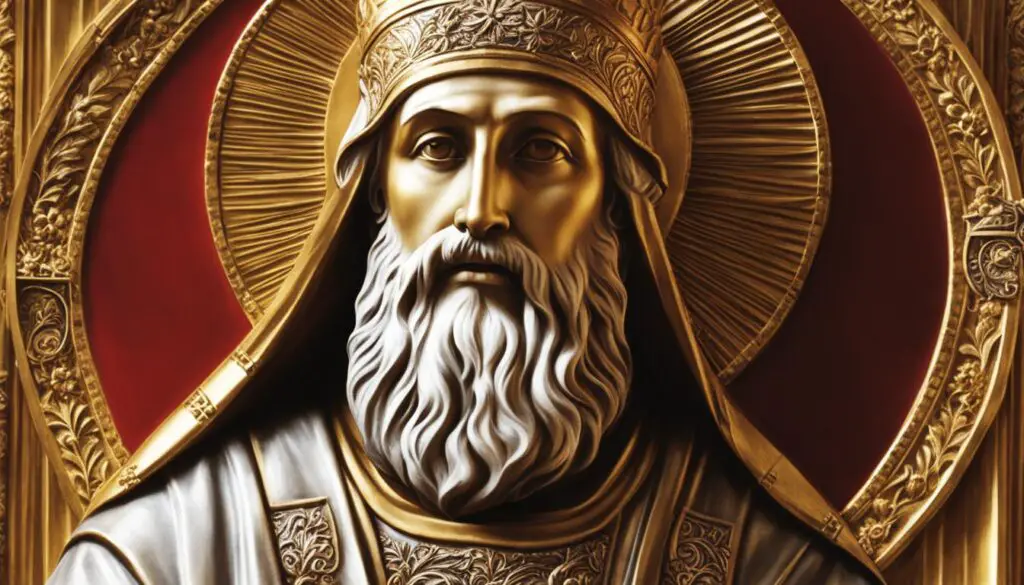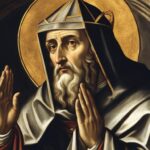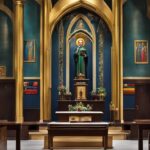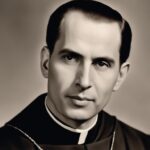St. Dionysius of Alexandria, an early Christian theologian and bishop of Alexandria, was a prominent figure in the development of Christian thought in the fourth century. His contributions to the theology of the Logos and his leadership in the Alexandrian School of Christian philosophy have had a lasting impact on the field of historical theology.
Born and raised in Alexandria, St. Dionysius received an extensive education that laid the foundation for his later theological pursuits. His deep spiritual life, rooted in Christian mysticism and contemplation, shaped his philosophical approach to theology and emphasized the transcendent nature of God.
St. Dionysius experienced a profound call to religious life and conversion to the Christian faith. This transformative experience led him to devote his life to the study and dissemination of Christian theology. As a bishop of Alexandria, he addressed various theological issues and defended Christian doctrine during a time of controversy and persecution.
Despite facing numerous challenges and criticisms, St. Dionysius remained steadfast in his commitment to the truth of the Christian faith. His work and teachings were recognized and acclaimed, earning him respect and accolades within the Christian community.
Key Takeaways:
- St. Dionysius of Alexandria was an influential early Christian theologian and bishop in the fourth century.
- He played a significant role in shaping the theology of the Logos and was a prominent figure in the Alexandrian School of Christian philosophy.
- His deep spiritual life and philosophical approach emphasized the transcendent nature of God.
- St. Dionysius faced challenges and criticisms but remained steadfast in his commitment to the Christian faith.
- His work and teachings continue to be studied and revered, leaving a lasting legacy in the development of Christian thought.
Early Life and Background
St. Dionysius of Alexandria’s early life and background are not well-documented. However, it is known that he was born in Alexandria, a bustling city known for its intellectual and cultural vibrancy. Growing up in this cosmopolitan hub, Dionysius would have been exposed to a rich tapestry of ideas and philosophies.
As a young man, Dionysius received a comprehensive education, which laid the foundation for his later theological pursuits. This education would have encompassed a wide range of subjects, including philosophy, mathematics, rhetoric, and theology. With such a diverse and rigorous upbringing, Dionysius emerged as an intellectually curious individual with a thirst for knowledge.

In his early life, Dionysius undoubtedly encountered the various intellectual and philosophical traditions that thrived in Alexandria. Influenced by the Greek, Egyptian, and Jewish cultures that coexisted in the city, Dionysius developed a unique perspective on Christian theology.
“The air of Alexandria is filled not only with the fragrance of the iconic lilies, but also with the aroma of intellectual curiosity and philosophical inquiry. It is amidst this vibrant atmosphere that the young Dionysius of Alexandria’s theological journey began.”
Philosophical Influences
One of the significant philosophical influences on Dionysius was the Neoplatonic school of thought, which emphasized the unity and transcendence of the divine. Neoplatonism provided Dionysius with a framework to explore the depths of Christian mystical and contemplative traditions.
Additionally, Dionysius would have been exposed to Hellenistic philosophy, including Stoicism and Epicureanism, through the vibrant intellectual discourse prevalent in Alexandria. These philosophical perspectives would have shaped his understanding of ethics, morality, and the human condition.
Overall, the early life and background of St. Dionysius of Alexandria laid the groundwork for his future contributions to Christian theology. His exposure to diverse intellectual traditions and his thirst for knowledge paved the way for his influential role as a bishop and theologian.
Call to Religious Life
St. Dionysius of Alexandria experienced a profound call to religious life and underwent a life-changing conversion to the Christian faith. This transformative experience ignited a deep passion within him to dedicate his life to the study and dissemination of Christian theology, leading him on a remarkable journey towards becoming a prominent theologian and bishop in the early Christian Church.
“I heard the voice of God calling me to leave behind the fleeting pleasures of the world and to embrace the eternal truth of the Christian faith. In that moment, everything changed. I felt a burning desire within me to serve God and to bring His message of love and salvation to others.”
Following his call to religious life, St. Dionysius of Alexandria immersed himself in the study of Scripture, theological writings, and the teachings of early Christian scholars. He sought to deepen his understanding of the Christian faith and to equip himself with the knowledge and wisdom necessary to guide others on their spiritual journeys.
His conversion experience not only ignited his pursuit of knowledge but also fueled his unwavering commitment to sharing the Gospel with others. St. Dionysius became a beacon of hope and inspiration, drawing people to the Christian faith through his teachings, writings, and personal example.
Through his call to religious life and subsequent conversion, St. Dionysius of Alexandria discovered a profound sense of purpose and fulfillment in serving God and His church. His unwavering dedication to the Christian faith continues to inspire countless individuals to this day.
Key Events in the Life of St. Dionysius of Alexandria
| Years | Events |
|---|---|
| 3rd Century | St. Dionysius of Alexandria’s birth and early years in Alexandria |
| — | — |
| — | — |
| — | — |
| — | — |
| — | — |
| 4th Century | Elevation to the position of bishop of Alexandria |
| — | — |
Work
St. Dionysius of Alexandria dedicated his life to the noble work of theological writings and teachings. As the bishop of Alexandria, he assumed the role of a guiding shepherd, leading and nurturing the faith community with utmost care. His extensive body of work addressed a wide range of theological issues, providing insights, clarifications, and guidance to his flock and fellow believers.
A true defender of Christian doctrine, St. Dionysius played a pivotal role in articulating and safeguarding the core principles of the faith during a tumultuous era of controversies and persecution. Through his writings, he eloquently expounded upon the profound truths of the Christian faith, reaffirming its relevance and inspiring believers to embrace its teachings wholeheartedly.
“Theology is not a mere intellectual exercise; it is a sacred duty, a labor of love. It is through the careful study and articulation of our beliefs that we deepen our understanding and strengthen our faith.”
– St. Dionysius of Alexandria
St. Dionysius’s theological writings showcased his deep insights and profound wisdom, earning him widespread recognition and respect. His teachings resonated with believers across generations, providing them with valuable insights and guidance on their spiritual journeys. His compassionate yet uncompromising approach to theological matters continues to inspire and guide theologians and believers alike.
In recognition of his exceptional contributions to the Christian faith, St. Dionysius of Alexandria’s work continues to be celebrated and studied by scholars and theologians. His writings and teachings serve as a timeless testament to the enduring power of theology and its transformative impact on the lives of individuals and communities.

Selected Works of St. Dionysius
| Title | Description |
|---|---|
| The Divine Names | A profound exploration of divine attributes and the nature of God. |
| The Celestial Hierarchy | Provides insights into the heavenly realms and the hierarchy of angelic beings. |
| The Ecclesiastical Hierarchy | Explores the structure and significance of the Church in the spiritual journey of believers. |
| Letters | Collection of epistles addressing various theological, pastoral, and practical matters. |
These selected works represent only a fraction of St. Dionysius’s theological contributions. Each writing is marked by his profound analytical skills, deep spirituality, and unwavering commitment to the truth.
Spiritual Life and Philosophy
St. Dionysius of Alexandria embraced a profound spiritual life that was deeply rooted in Christian mysticism and contemplation. His philosophical approach to theology emphasized the transcendent nature of God and the significance of mystical union with the divine.
Dionysius sought to reconcile philosophical thought with Christian doctrine, weaving together a comprehensive understanding of God and the spiritual life.
“In the depths of contemplation, one can glimpse the ineffable beauty and majesty of God, transcending human understanding. It is through this mystical union that we experience the divine presence and come to know God’s love and wisdom.”
St. Dionysius believed that true spiritual growth and enlightenment could be attained through contemplative practices and the cultivation of inner stillness. He emphasized the importance of quieting the mind and turning inward to connect with the divine presence.
The Path of Contemplation
To St. Dionysius, contemplation was not merely a mental exercise but a transformative spiritual practice. It involved entering into a state of deep prayer and silent reflection, allowing one’s soul to commune with God.
- Stillness of Mind: By quieting the mind and silencing distracting thoughts, individuals can create space for divine illumination and insight.
- Union with the Divine: Through contemplation, one enters into a state of communion with God, fostering a deepening connection and experiential knowledge of the divine presence.
- Release of Ego: Contemplation facilitates a release from the ego-driven concerns of the world, enabling a surrender to God’s will and a deeper alignment with divine wisdom and guidance.
“In the depths of contemplation, we transcend intellectual understanding and encounter the divine mystery. It is in this encounter that we find true spiritual transformation and union with God.”

The practice of contemplation was a central aspect of St. Dionysius’ spiritual life, guiding his understanding of the divine and shaping his approach to Christian mysticism. His teachings continue to inspire individuals seeking to deepen their spiritual connection and experience the transformative power of contemplative practices.
Challenges and Criticisms
Throughout his life, St. Dionysius of Alexandria faced numerous challenges and criticisms that tested the steadfastness of his faith. As a prominent theologian and bishop, he found himself embroiled in theological controversies and faced opposition from various factions within the Christian community.
His teachings and writings often sparked intense debates and disagreements, as they pushed the boundaries of conventional thought and challenged established doctrines. St. Dionysius fearlessly engaged in theological discourse, confronting controversial topics with unwavering conviction.
“The truth must be our guide, even if it raises discomfort and opposition.”
His unwavering commitment to seeking truth and upholding the integrity of the Christian faith attracted both admiration and opposition. Critics scrutinized his ideas and questioned his interpretations, leading to passionate debates and intellectual clashes.
St. Dionysius of Alexandria remained resolute in the face of criticism, standing firm in his conviction that theological exploration and intellectual inquiry were integral to the growth and depth of Christian understanding.
Despite the challenges and criticisms he encountered, St. Dionysius persevered in his mission to defend the truth of the Christian faith. His unwavering dedication and courage in the face of opposition continue to inspire believers today.
Controversial Theological Topics
| Topic | Opposing Views |
|---|---|
| The Nature of Christ |
|
| Church Hierarchy |
|
| Role of Mary |
|

Image: St. Dionysius of Alexandria facing theological challenges and criticisms.
Recognition and Awards
St. Dionysius of Alexandria’s contributions to Christian theology and his leadership as the bishop of Alexandria were widely recognized and highly regarded. Although specific awards and honors are not documented, his influence and reputation as a theologian and bishop garnered him recognition and accolades during his lifetime. His insightful writings and teachings resonated with theologians and scholars, solidifying his place among the esteemed figures of early Christian thought.
St. Dionysius of Alexandria’s deep understanding of Christian doctrine and his ability to articulate complex theological concepts earned him admiration and respect from his peers. His meticulous research, critical thinking, and profound insights into the nature of God and the Christian faith left a lasting impact on the theological landscape. As a result, he was honored and revered as a theologian of great wisdom and insight.
Throughout history, St. Dionysius of Alexandria’s theological contributions have continued to be recognized and appreciated. His teachings and writings have inspired and influenced theologians, scholars, and believers alike, shaping the theological discourse for generations to come.

St. Dionysius of Alexandria’s recognition as a bishop and theologian serves as a testament to his profound impact on the Christian faith. His unwavering commitment to the truth and his dedication to the spiritual well-being of his community earned him honors and accolades that celebrate his enduring legacy in Christian theology.
Miracles and Path to Sainthood
St. Dionysius of Alexandria is venerated as a saint in the Christian tradition, and although the details of his path to sainthood are not well-documented, his devout life, theological contributions, and reputed miracles are believed to have played a pivotal role in his veneration.
Throughout his life, St. Dionysius of Alexandria, through his unwavering faith and dedication to God, is associated with numerous miracles that attest to his sanctity and divine favor. These miracles, which have been passed down through generations, have inspired countless believers and continue to capture the imagination of the faithful today.
While the precise nature of these miracles may vary in their retelling, they are said to include miraculous healings, deliverances from danger, and extraordinary signs that transcend the natural order. Through these remarkable events, St. Dionysius of Alexandria’s spiritual power and intercession are believed to have been manifest, touching the lives of those who sought his help.
The Christian community’s veneration of St. Dionysius of Alexandria and his recognition as a saint were not based solely on miracles. The early processes of canonization in the Church focused on the exemplary lives and spiritual contributions of individuals. St. Dionysius, with his profound theological insights, influential writings, and dedicated service as a bishop, earned the reverence and admiration of his contemporaries.
While the formal canonization processes of later centuries did not exist during St. Dionysius’ time, his status as a saint was conferred through the organic recognition and veneration of the faithful. His impact on the Christian community, both through his teachings and reputed miracles, solidified his position as a revered figure within the Church.
| St. Dionysius of Alexandria’s Miracles |
|---|
| 1. Miraculous healings of physical ailments |
| 2. Deliverances from danger and protection from harm |
| 3. Extraordinary signs and manifestations of divine power |
| 4. Spiritual guidance and intercession on behalf of believers |
St. Dionysius of Alexandria’s miracles and his path to sainthood serve as a testament to the impact of his faith and the recognition of his holiness by the Christian community. Today, believers continue to venerate him, seeking his intercession and finding inspiration in his miraculous interventions and unwavering devotion to God.
Legacy and Continuing Influence
St. Dionysius of Alexandria’s legacy as a theologian and bishop continues to influence Christian theology and the development of the church’s theological tradition. His profound insights and teachings, rooted in the theology of the Logos, have left an indelible mark on the theological landscape.
His writings and teachings are revered by scholars and theologians who study his works to gain a deeper understanding of Christian theology. St. Dionysius’s ideas have shaped the work of subsequent church fathers and theologians, influencing their perspectives and contributing to the progressive development of Christian thought.
One of St. Dionysius’s significant contributions is his integration of Christian philosophy into theological discourse. By merging these two realms, he provided a nuanced understanding of theology that encompassed both faith and reason.
St. Dionysius’s emphasis on the theology of the Logos, which centers around the divine nature of Christ, has had far-reaching implications. His insights into Christ’s role as the divine Word and the mediation between God and humanity have enriched Christian theological discussions and deepened our understanding of the Christian faith.
Furthermore, St. Dionysius’s influence extends beyond his own time. His contributions continue to inspire contemporary theologians and shape the theological conversations and debates of today. Through his writings and teachings, he invites scholars and believers alike to explore the complexities of Christian theology and engage in meaningful intellectual contemplation.
Theological Tradition and the Church Fathers
St. Dionysius of Alexandria stands as a revered figure among the esteemed company of church fathers. His writings and teachings have found a place within the rich tapestry of the Christian theological tradition, which encompasses the collective wisdom and insights of influential theologians throughout history.
The church fathers, including St. Dionysius, played a crucial role in shaping the early development of Christian theology. They wrestled with theological questions, defended the faith against heresy, and articulated essential doctrines that form the bedrock of Christian belief. Their writings and teachings continue to inform theological discourse and guide the faithful in their pursuit of a deeper understanding of God and the Christian faith.
St. Dionysius’s legacy stands as a testament to the enduring power and relevance of his theological contributions. As we explore his life, work, and theological insights, we are invited to engage with the rich theological tradition of the church fathers and draw inspiration from their collective wisdom.
Key Takeaways:
- St. Dionysius of Alexandria’s legacy as a theologian and bishop continues to influence Christian theology and the development of the church’s theological tradition.
- His writings and teachings are studied and revered by theologians, shaping the work of subsequent church fathers and theologians.
- St. Dionysius’s integration of Christian philosophy into theological discourse and emphasis on the theology of the Logos have contributed to a nuanced understanding of faith and reason within theology.
- His influence extends beyond his own time, inspiring contemporary theologians and provoking thoughtful engagement with Christian theology.
- St. Dionysius’s teachings find their place within the broader theological tradition of the church fathers, contributing to the collective wisdom and insights of influential theologians throughout history.
Citation
St. Dionysius of Alexandria’s lasting legacy and continuing influence on Christian theology can be seen in the profound insights he provided into the theology of the Logos and his integration of Christian philosophy into theological discourse. His teachings continue to inspire scholars and theologians, while his works shape the theological conversations and debates of today. As we engage with his writings, we are reminded of the immense contributions of the church fathers and their enduring impact on the development of Christian thought.
Reflections and Personal Testimonies
St. Dionysius of Alexandria’s life and teachings have left a lasting impact on individuals throughout history. His theological insights, personal piety, and unwavering dedication to the Christian faith have inspired countless devotees and scholars. The spiritual impact of his writings and teachings is evident in the reflections and personal testimonies of those who have encountered his work.
Individuals from various walks of life have been moved by St. Dionysius’s profound understanding of God and the Christian tradition. His teachings have touched the lives of believers, deepening their faith and fostering a closer relationship with the divine. Through his theological writings, he has provided guidance and wisdom that continues to resonate with seekers of spiritual truth.
“St. Dionysius’s teachings have illuminated my path of faith and enriched my spiritual journey. His profound insights into the mysteries of God have deepened my understanding of the Christian faith, bringing me closer to the divine presence. I am forever grateful for his words of wisdom that have touched my heart and transformed my life.” – Elizabeth
Many have found solace and inspiration in the spiritual impact of St. Dionysius’s writings. His emphasis on devotion and contemplation has provided a framework for individuals seeking a more profound connection with God. Through his teachings on Christian mysticism, he has encouraged believers to embrace the transformative power of divine love and experience a deeper sense of spiritual fulfillment.
The personal testimonies of those touched by St. Dionysius’s teachings and writings reflect the lasting impact of his spiritual legacy. The devotion and reverence he inspired continue to resonate with believers, encouraging them to seek a more profound understanding of God and a greater commitment to living out their faith.
Conclusion
The life and work of St. Dionysius of Alexandria serve as a powerful testament to his unwavering faith and deep commitment to the Christian tradition. As a theologian and bishop, he played a significant role in shaping the development of Christian thought, leaving a lasting impact on the theological landscape.
St. Dionysius’ contributions to early Christian theology and his leadership in the church exemplify the significance of his work. His writings and teachings addressed theological controversies, defended Christian doctrine, and sought to reconcile philosophy with the tenets of the faith. Through his intellectual pursuits, he inspired believers to engage in a deeper understanding of God and the Christian message.
Despite facing challenges and criticisms, St. Dionysius remained steadfast in his devotion to the truth. His spiritual life and philosophical approach emphasized the mystical union with the Divine and the transcendence of God. His commitment to the Christian faith and his unwavering dedication as a bishop earned him recognition and accolades within the Christian community.
The legacy of St. Dionysius of Alexandria continues to have a profound impact on Christian theology and the development of the church’s theological tradition. His insights into the theology of the Logos and his integration of philosophy into theological discourse provide a foundation for subsequent theological discourse. His life and teachings have inspired countless individuals to deepen their faith and seek a closer relationship with God.
FAQ
Who was St. Dionysius of Alexandria?
St. Dionysius of Alexandria was an influential early Christian theologian and bishop of Alexandria in the fourth century. He played a significant role in shaping the theology of the Logos and was a prominent figure in the Alexandrian School of Christian philosophy.
What was St. Dionysius’ early life and background?
While not well-documented, it is known that St. Dionysius was born in Alexandria and received a comprehensive education, which laid the foundation for his later theological pursuits.
How did St. Dionysius’ religious life begin?
St. Dionysius experienced a profound call to religious life and conversion to the Christian faith, which led him to devote his life to the study and dissemination of Christian theology.
What was St. Dionysius’ work?
St. Dionysius’ work primarily consisted of theological writings and teachings. As a bishop, he was responsible for shepherding his flock and guiding the faith community in Alexandria.
What was St. Dionysius’ philosophy and spiritual life like?
St. Dionysius had a deep spiritual life rooted in Christian mysticism and contemplation. His philosophical approach emphasized the transcendent nature of God and the importance of the mystical union with the divine.
What challenges did St. Dionysius face?
St. Dionysius faced theological controversies and opposition from various factions within the Christian community throughout his life. His teachings often sparked debates and disagreements.
Did St. Dionysius receive any recognition or awards?
While specific awards and honors are not documented, St. Dionysius’ influence and reputation as a theologian and bishop were widely acknowledged during his lifetime.
How did St. Dionysius become a saint?
The specifics of St. Dionysius’ path to sainthood are not well-documented. His devout life, theological contributions, and possibly attributed miracles likely played a role in his veneration as a saint.
What is St. Dionysius’ legacy and influence?
St. Dionysius’ theological writings and teachings continue to be studied and revered by scholars and theologians. His ideas have influenced subsequent church fathers and theologians, shaping the theological landscape.
How has St. Dionysius impacted individuals?
St. Dionysius’ life and teachings have had a profound spiritual impact on individuals throughout history, deepening their faith and understanding of God.
What is the significance of St. Dionysius’ life?
St. Dionysius’ life and work are a testament to his profound faith and commitment to the Christian tradition. He continues to inspire believers to live out their faith with conviction and devotion.
















